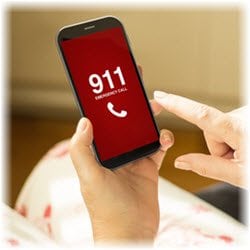When a Stroke Happens, Every Second Counts
 If you are with someone you suspect is having a stroke, what you do can make the difference between life or death and can limit future disability. That’s why it’s important to know how to identify a stroke and to be prepared for what you should do (or not do) if you think someone is having a stroke. Here’s how to recognize the signs of a stroke so you can get help quickly.
If you are with someone you suspect is having a stroke, what you do can make the difference between life or death and can limit future disability. That’s why it’s important to know how to identify a stroke and to be prepared for what you should do (or not do) if you think someone is having a stroke. Here’s how to recognize the signs of a stroke so you can get help quickly.
Signs of a Stroke
The first thing you need to know is how to determine if someone may be having a stroke. Stroke symptoms come on very suddenly and are often characterized by weakness, numbness, trouble talking or loss of vision.
Think of the word FAST when it comes to identifying stroke symptoms:
- F – FACE: Ask the person to smile. Is one side drooping?
- A – ARM: Ask the person to raise both arms. Is one arm drifting downward?
- S – SPEECH: Ask the person to say something. Does what they say make sense or sound strange?
- T – TIME: If you observe these symptoms, call 911 immediately.
What to Do If You Think Someone Is Having a Stroke
Adrian Burgos MD, a PIH Health Neurologist, says, “If you suspect someone is having a stroke, call 911 right away. Tell the 911 dispatcher that you think someone is having a stroke and where you are located so they can get to you as fast as possible.”
Note the time that you first notice symptoms. Even more importantly, note the last time the person was seen in their normal state. If someone awakens from sleep with stroke symptoms, the time they were last seen in a normal state may be long before the time symptoms were first noticed. This information is important because it can help health professionals make the most informed decision about treatments. A clot-busting medication called tPA (tissue plasminogen activator) may stop debilitating symptoms from developing but only if it’s given in time (within 4 ½ hours of symptom onset). There are also surgical treatments that may be done but they must be performed within a specific timeframe.
Stay with the person until emergency help arrives. Although most stroke patients don’t require it, perform CPR if the person becomes unconscious and they are not breathing and don’t have a pulse. If you don’t know how to do CPR, ask the 911 dispatcher to walk you through what to do while you wait for the ambulance.
What Not to Do If You Suspect a Stroke
It may not be immediately apparent that someone is having a stroke but if you notice any of the symptoms listed above, don’t delay in getting medical help even if the person otherwise seems okay.
Dr. Burgos also notes that there are some things you shouldn’t do if you think someone is having a stroke, such as:
- Don’t let the person talk you out of calling 911. Time is the most important factor affecting whether a stroke causes lasting and debilitating problems.
- A person having a stroke may suddenly feel very sleepy but don’t let them go to sleep. Keep them up and get them to a hospital where they can be evaluated and get treatment quickly.
- Don’t give anyone who may be having a stroke medication, especially aspirin. If the stroke is caused by a ruptured blood vessel (20% are), this can make things worse.
- Don’t let the person eat or drink anything. Having a stroke may affect a person’s ability to swallow.
- Don’t drive the person to the hospital yourself unless absolutely necessary. Calling 911 is the best course of action because emergency responders can begin treatment on the way if needed.
It can be very scary to witness someone having a stroke, but knowing how to spot the signs and what to do or not do can help you save the person’s life.
Once again, it is vital that If you or a loved one has symptoms of a stroke, call 9-1-1 right away so that you’re transported to an emergency room as fast as possible and can receive treatment from our top-quality stroke care team at PIH Health Good Samaritan Hospital and PIH Health Whittier Hospital. They both hold the following recognitions:
- Comprehensive Stroke Center – They have the resources, staff and training to treat any kind of stroke.
- Get with the Guidelines®-Stroke Gold-Plus Quality Achievement Award – They make sure patients get the most appropriate treatment according to nationally recognized, research-based guidelines
To learn more about Dr. Burgos visit us at https://www.pihhealth.org/find-a-doctor/ or visit https://www.pihhealth.org/ERStroke for more information on PIH Health’s Stroke Care.
Copyright 2022 © Baldwin Publishing, Inc. All rights reserved. Health eCooking® is a registered trademark of Baldwin Publishing, Inc. Cook eKitchen™ is a designated trademark of Baldwin Publishing, Inc. Any duplication or distribution of the information contained herein without the express approval of Baldwin Publishing, Inc. is strictly prohibited.